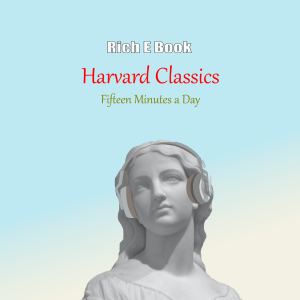
279.5K
Downloads
736
Episodes
Former President of Harvard University Charles W. Eliot wrote in his introduction to the Harvard Classics, "In my opinion, a five-foot shelf would hold books enough to give a liberal education to any one who would read them with devotion, even if he could spare but fifteen minutes a day for reading." Here you are, you can easily listen to his entire 15-minutes-a-day study guide while commuting to and from work (most of us spend far more than 15 minutes a day commuting each day), doing mundane work in the office, washing dishes at home, or doing most of the things day in and day out. It is so easy, so entertaining, and so educational that they can be listened to again and again, until they permeate into our own thinking and into our characters. Perhaps, in one year's time, you will become someone you barely recognize, all for the better. Who knows?
-- Rich E Book
Former President of Harvard University Charles W. Eliot wrote in his introduction to the Harvard Classics, "In my opinion, a five-foot shelf would hold books enough to give a liberal education to any one who would read them with devotion, even if he could spare but fifteen minutes a day for reading." Here you are, you can easily listen to his entire 15-minutes-a-day study guide while commuting to and from work (most of us spend far more than 15 minutes a day commuting each day), doing mundane work in the office, washing dishes at home, or doing most of the things day in and day out. It is so easy, so entertaining, and so educational that they can be listened to again and again, until they permeate into our own thinking and into our characters. Perhaps, in one year's time, you will become someone you barely recognize, all for the better. Who knows?
-- Rich E Book
Episodes

Saturday Nov 06, 2021
Introductory Note: Michael Faraday
Saturday Nov 06, 2021
Saturday Nov 06, 2021
Introductory note on Michael Faraday (Volume 30, Harvard Classics)

Saturday Nov 06, 2021
The Force of Gravitation, by Michael Faraday
Saturday Nov 06, 2021
Saturday Nov 06, 2021
Two sticks, a table, and a pail were the commonplace implements used by Michael Faraday to demonstrate great scientific truths. (Volume 30, Harvard Classics)
Faraday sends "Experimental Researches" to Royal Society, Nov. 6, 1845.

Friday Nov 05, 2021
Introductory Note: Sir Thomas More
Friday Nov 05, 2021
Friday Nov 05, 2021
Introductory note on Sir Thomas More (Volume 36, Harvard Classics)

Friday Nov 05, 2021
The Life of Sir Thomas More, by William Roper
Friday Nov 05, 2021
Friday Nov 05, 2021
A divorce always means trouble for some one. So with Sir Thomas More when he refused to agree with King Henry over the king's separation. More was made to pay one of the highest prices ever paid for a difference of opinion. (Volume 36, Harvard Classics)

Thursday Nov 04, 2021
Introductory Note: Pierre Corneille
Thursday Nov 04, 2021
Thursday Nov 04, 2021
Introductory note on Pierre Corneille (Volume 26, Harvard Classics)

Thursday Nov 04, 2021
Polyeucte, by Pierre Corneille
Thursday Nov 04, 2021
Thursday Nov 04, 2021
Polyeucte, an Armenian noble, wanted to become a Christian. If he were baptized, he would have to give up his high position, his wealth and his pagan wife. Was the heavenly crown worth this sacrifice? (Volume 26, Harvard Classics)

Wednesday Nov 03, 2021
Introductory Note: Pliny the Younger
Wednesday Nov 03, 2021
Wednesday Nov 03, 2021
Introductory note on Pliny the Younger (Volume 9, Harvard Classics)

Wednesday Nov 03, 2021
Letters (To the Emperor Trajan), by Pliny the Younger
Wednesday Nov 03, 2021
Wednesday Nov 03, 2021
Pliny sought the advice of the Emperor Trajan for dealing with the Christians who were alarmingly on the increase. He casually relates how he had tortured two Christians. (Volume 9, Harvard Classics)

Tuesday Nov 02, 2021
Introductory Note: Dante Alighieri
Tuesday Nov 02, 2021
Tuesday Nov 02, 2021
Introductory note on Dante Alighieri (Volume 20, Harvard Classics)

Tuesday Nov 02, 2021
The Divine Comedy (Inferno, Canto III & IV), by Dante Alighieri
Tuesday Nov 02, 2021
Tuesday Nov 02, 2021
Dante recorded the awful scenes of a journey through the pits of the underworld, and wrote in such a vivid, realistic way that men tremble at the terrors depicted. (Volume 20, Harvard Classics)
